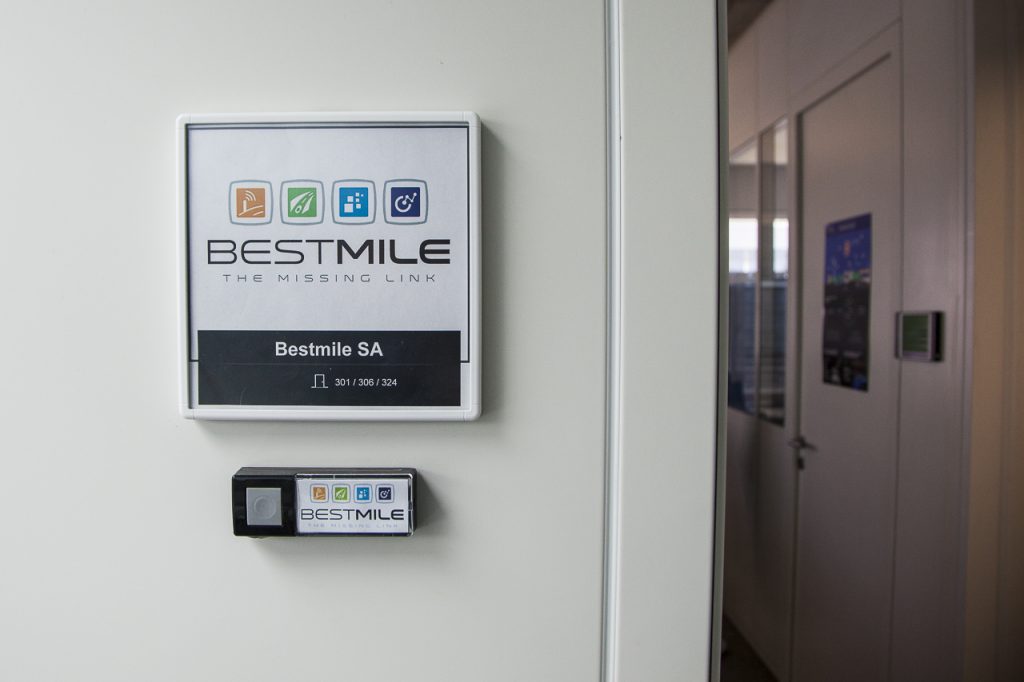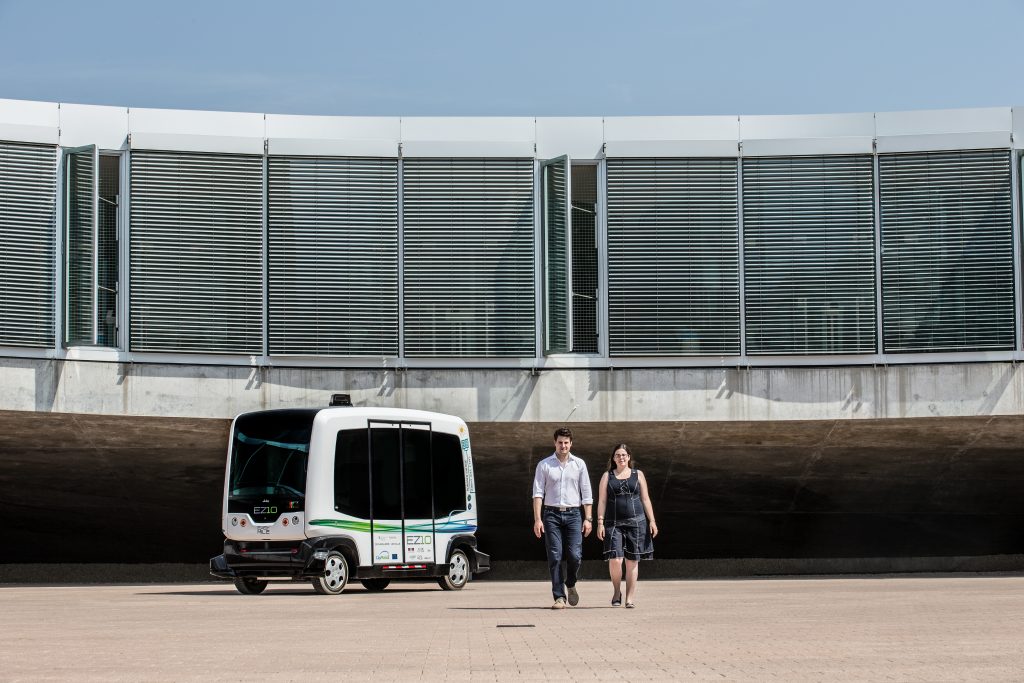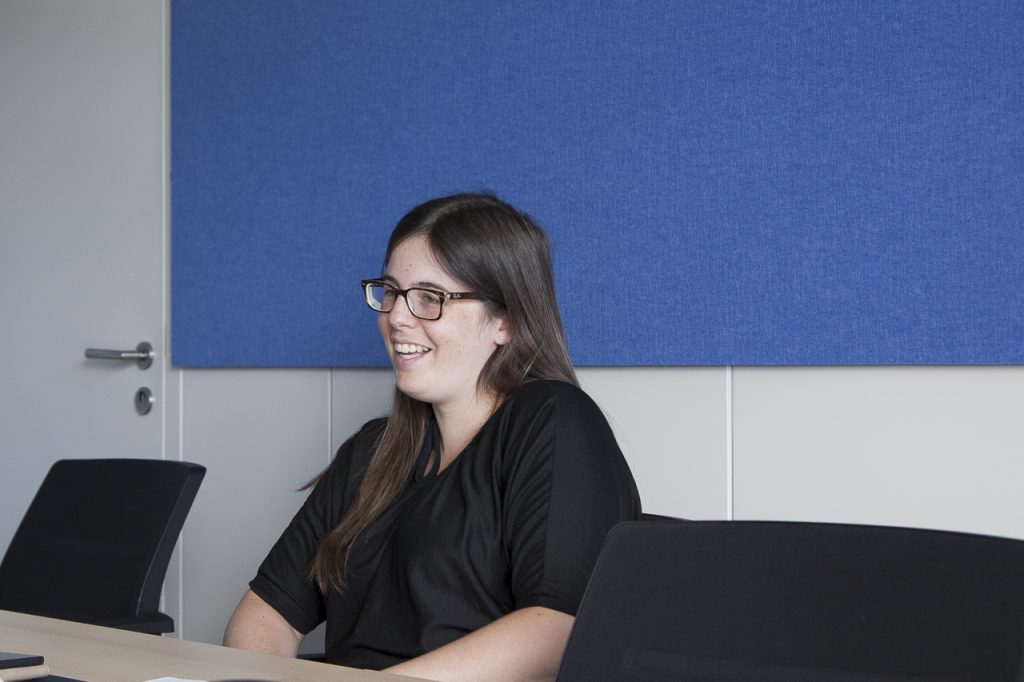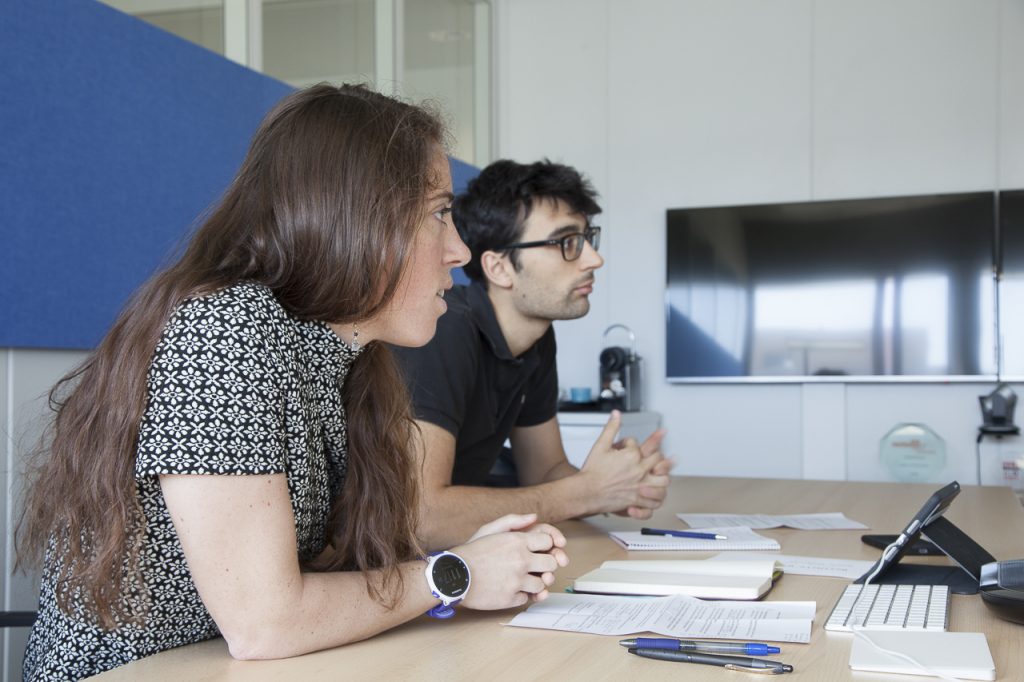Branch
Select your branch
An interview with BestMile: Cloud intelligence for driverless vehicles
Innovator of the Month Interview by Caterina Bigoni ned Niccolò Dal Santo
— Photo Credit: Francesco Pennacchio, Club Photo EPFL
Autonomous vehicles are becoming a more and more established reality, whose market is constantly and rapidly growing. And it is rather easy to figure out why: reduced costs, increased safety and traffic flow, improved mobility for disabled and elderly people are only a few of the relevant advantages entailed by the use of driverless machines. All these reasons, together with the recent advances in the high performance computing and algorithmic techniques, yielded a considerable improvement to this technology, and a growing interest by both industries and government. In January 2016, the former US administration led by President Barack Obama has announced a massive proposal which expects to allocate $4bn in the following 10 years with a clear goal: bring self-driving cars to the US roads.
However, before seeing our roads populated by driverless cars, some obstacles need to be overcome: firstly, there is a considerable need for common regulations and guidelines for producers, and secondly thousands of vehicles, eventually produced with different hardware and software, need to be managed simultaneously. This latter point is where BestMile enters into play.
Founded in 2014, BestMile is a leading vaudoise company in the field of driverless cars and the world’s first cloud platform for the operation and the optimization of fleets of autonomous vehicles. It is a virtuous entrepreneurial reality in the Lausanne startup ecosystem, and its main office, located at the Innovation Park of EPFL with more than 30 employees, has been rapidly followed by a smaller branch in San Francisco.
Being recognized as one of the most successful Swiss startups, Innovation Forum Lausanne (IFL) has awarded BestMile as the May Innovator of the Month. On May 9 we have been welcomed by the VP of Operations and co-founder Anne Mellano, who has given us some of her time to deepen the subject of autonomous vehicles and to share her experience as young entrepreneur. Here is the outcome of this interesting chat.
IF Lausanne: Autonomous vehicles are a very hot topic and big companies are investing a lot of money on it. How does it feel to be in the same market with giants of the technology as Google, just to mention one? What is your goal and how do you differentiate from them?
Anne: Indeed, we are in the same ecosystem as Google, but there is not direct competition. These big companies are currently focused on developing autonomous cars and embedded automation technologies. BestMile’s goal is to enable the deployment of autonomous mobility services by coordinating and optimizing fleets of driverless vehicles, which may eventually be made by different companies. This is a comparison I always like to do: BestMile is like the control tower of an airport: we are not building the vehicles or the autopilot but we decide what every one of them has to do and coordinate the entire process.
BestMile is like the control tower of an airport: we are not building the vehicles or the autopilot but we decide what every one of them has to do and coordinate the entire process.
IF Lausanne: And how do you practically provide this decision making to the fleet?
Anne: Autonomous vehicles are very clever; they know how to drive and how to overcome obstacles in their direct environment, but they are also very individualistic. They are not aware of what other cars are doing or what is happening in the network at a global scale, and this is a bottleneck for the quality of the service; it leads to the need of an intelligent coordination tool which allows to obtain a coherent service. We optimize and coordinate the dispatch, the route as well as the energy management of the vehicles according to real-time and forecasted traffic conditions, demands (travel requests) and vehicles’ telematics. Once the data is processed, the platform sends the right mission to each autonomous vehicle and makes sure that they are always at the right place at the right time.
IF Lausanne: What are the main difficulties towards this goal?
Anne: First of all, we have to consider that today is probably the most critical time for autonomous vehicles industry as they have to cohabitate with human-driven vehicles. Secondly, one of the hardest challenge is related to real time decisions which must comply with the requested service and the availability of the vehicles in terms of number and battery levels. We must be able to efficiently react to unforeseen events, such as new obstacles or slower traffic. Reaction is our mantra. Finally, security must always be a primary concern: when we send the mission to the vehicles they first have to confirm that those actions are feasible with respect to the actual limitations.
We must be able to efficiently react to unforeseen events, such as new obstacles or slower traffic. Reaction is our mantra.
IF Lausanne: We have seen BestMile technology around EPFL campus in 2015 and now the SmartShuttle project in Sion. Are your vehicles only on pedestrian streets or also on public roads?
Anne: We are currently enabling a service in the city center of Sion, where a fleet of two driverless shuttles evolves on both pedestrian and public (reduced velocity) roads. And it may be a shocking news, but managing vehicles on pedestrian roads is much harder! Pedestrians are unpredictable and tend to “jump” right in front of the vehicles. You also have many more obstacles which could cross the planned trajectory, and the velocity of the surrounding objects is highly variable. Indeed, slow speed does not always mean increased security, and having bodies with different velocities is one of the main challenges for us: on pedestrian streets we need to be slow to secure people’s safety, but on public roads a slow speed may cause an insecure environment.
IF Lausanne: What about your perspectives for the future? After EPFL and Sion, how do you see the future of autonomous vehicles and BestMile in ten years?
Anne: Our dream is a fully autonomous one. This future might be much closer than you think! The years 2020/2021 represents a tipping point for autonomous mobility industry mainly because of two events: the Tokyo Olympics, followed by the Dubai World Exposition. A tremendous attention will be captured by these events, and the organizers are ready to fascinate visitors by showing off all the marvelous novelties, including those in the field of autonomous vehicles. Vehicles manufacturers have a strong incentive to be ready with their autonomous vehicles and it’s not surprising that pretty much every one of them have announced a commercial release for 2021.
Later on, two main steps need to be taken: raise the awareness and reach a full acceptance of autonomous vehicles as well as adapt the legislation.
IF Lausanne: Let’s move the conversation to your background and Raphaël Gindrat’s, BestMile’s CEO. How did it happen that you co-founded BestMile?
Anne: We both studied civil engineering with specialization in transportation planning and management at EPFL, spending three out of five years together, but merely talking to each other! Raphael was the first one involved in the field of autonomous vehicles, since he did an internship at Induct Technology, where he was in charge of testing the prototyping vehicles in collaboration with EPFL. In the meantime, I was working in an urban planning office in Lausanne as project manager coordinator for writing, among the others, CityMobil2, a proposal for autonomous vehicles on behalf of the EPFL laboratory where Raphaël worked. Even though EPFL had been granted six vehicles for eight months, nobody seemed to be willing to manage them (or knew how!). We decided to found a startup, and our first goal was to take care of these six shuttles. Once we finished this first project we realized we couldn’t just stop there.
IF Lausanne: How important is the synergy among the founders?
Anne: It is essential. Initially it was a bit like a game, but we needed to have a common strategy and share the same vision if we wanted to succeed. Today with Raphaël, we work very closely since we have complementary perspectives and dispatch the work according to our expertises. We are two very easy-going persons at the end.
IF Lausanne: How did you assign the roles in the company? Raphaël is the CEO and you the VP of Operations. Being that in Switzerland only 9% of founders of the Top 50 startups are women, do you feel that this choice was somehow biased by your gender?
Anne: Not at all! At the time we founded BestMile I was still working for the urban planning office, while Raphaël was fully devoted to the company, so it seemed a straightforward choice to have him as the CEO. However, I believe the ratio of female CEOs is also a matter of numbers: there are less girls attending civil engineering studies, so it is natural to have fewer female CEOs in this field. Moreover, if we consider that only in the last decades women had access to the same level of education of men, then we need role models to inspire young women to pursue the entrepreneurial career!
IF Lausanne: Have you ever thought of doing a PhD?
Anne: Yes, I have been asked to do one by a professor in civil engineering department at EPFL, but focusing on one topic for 3 to 5 years was not what I wanted to do; here I am happy because everyday there are new challenges to face. Nevertheless, we support and hire people holding a PhD, and it is important to guarantee the investors that our employees are able to accomplish tasks with a high level of precision. It surely increases our credibility, but let’s be honest, it is a big issue to change the PhD mindset from academia to industry: here we have strict deadlines by which we need to deliver a working product, which may eventually not be as elegant as the academic world wishes it to be.
IF Lausanne: You mentioned investors, and another thing they often ask for is IP. Have you patented your algorithms? How did you learn about IP in general?
Anne: Although, in our case patenting the software would mean to publish the code, which we do not really want to, we protect processes and micro servers. Investors like to be reassured with IPs. We learned about IP in general through our day-to-day experience and thanks to the help of this wonderful ecosystem we have around.
IF Lausanne: You anticipated our questions! How do you benefit of the innovative Lausanne ecosystem?
Anne: Especially at the beginning we received a lot of support by this environment, also because we are a software company but none of the co-founders is a software engineer! We were helped in setting up the hardware architecture and in hiring computer scientists: colleagues from another startup were writing our job offers and run the interviews for us.
We love to stay here on the EPFL campus, where we have our roots. We aim at doubling the size of the team by 2018, and we are at the moment negotiating with EPFL about our offices; I think this would be a win-win situation, since we are a company freshly built by two former EPFL students.
We love to stay here on the EPFL campus, where we have our roots.
IF Lausanne: And what about the opening to the US? Why did you choose to expand in San Francisco?
Anne: For a company in our field it is essential to be in Silicon Valley. On one hand, most of the autonomous mobility industries are located there and we need to be there to create partnerships and establish strong customer’s relationships. On the other hand, we are looking for our next round of financing of $15mln right now, and given the amount and the industry we are evolving in, the American investors ecosystem is more interesting and interested .
IF Lausanne: BestMile has won many competitions and prizes, like Prix Strategis in 2016 or the more recent Frost & Sullivan Award. How important is it for young startups to participate to these events?
Anne: I think it is essential in the beginning. Especially if you are looking for the first round of fundraising, when only a beta version of your product is available. It is important to acquire recognition and credibility by winning competitions, since it proves to the investors that you are reliable and your idea works. In addition, during such events, we often met people who were extremely helpful and gave us valuable advices.
IF Lausanne: What advice would you give to young entrepreneurs on their way to build a successful startup?
Anne: I would tell them not to underestimate the potential of their idea and product. We thought the market was not ready for our product yet, but we started this adventure three years ago and we are still here.
While we were having this conversation, Raphaël, the CEO and co-founder of BestMile was in his monthly tour of the world. However we have been able to reach him telematically to ask him a few more questions on his perspective, which may be beneficial for some EPFL students with the right entrepreneurial mindset.
IF Lausanne: How important was the experience as President of Agepoly and in student associations in general for building a successful startup?
Raphaël: During my studies, I was lucky to benefit from EPFL’s very active associative life. I served three years at the direction committee of the EPFL’s general student association (agepoly.ch) and I was its president for two years. It is commonly said that associations are very much like a company and I cannot agree more with that statement. My time in EPFL’s student associations taught me a lot, I learned organizational and managerial skills that I use everyday. Building a startup is a very intense experience and student associations were definitely a valuable training that helped and is still helping me through it.
My time in EPFL’s student associations taught me a lot, I learned organizational and managerial skills that I use everyday.
IF Lausanne: How did the Minor in Management Technology and Entrepreneurship at EPFL helped you in launching your startup? Are you still using some knowledge acquired during those studies now as the CEO of BestMile?
Raphaël: As the CEO of a startup, you have to oversee or do a lot of different activities, including finance, management and HR. The minor in Management Technology and Entrepreneurship allowed me to build a core knowledge in these fundamental subjects on which I could rely when launching BestMile.





